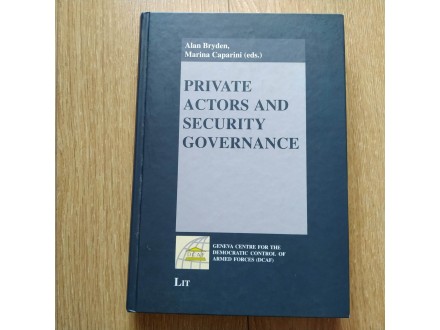PRIVATE ACTORS AND SECURITY GOVERNANCE
| Cena: |
| Želi ovaj predmet: | 1 |
| Stanje: | Polovan bez oštećenja |
| Garancija: | Ne |
| Isporuka: | Pošta Lično preuzimanje |
| Plaćanje: | Tekući račun (pre slanja) Lično |
| Grad: |
Smederevska Palanka, Smederevska Palanka |
ISBN: Ostalo
Godina izdanja: .
Jezik: Engleski
Autor: Strani
Solidno očuvana
Privane službe obezbeđenja
Privatna vojska
Geneva centre for the Democratic control of armed forces
Solidno očuvana, tvrd povez, na par mesta ponešto podvučeno
kutija10
While security has been traditionally understood as an exclusive function of the state, private and other non-state actors are assuming an increasingly central role in the provision of security. This book, published by the Geneva Centre for Democratic Control of Armed Forces, discusses security privatisation and its implications for security governance. Both international and national law and policy need to adjust to the privatisation transformation of security, while governments ensure that private security is performed according to core democratic values.
Over the past 30 years a global security transformation has taken place. Security provision is no longer performed exclusively by the state. Increased privatisation of security includes top-down decisions to outsource security tasks to private firms and bottom-up activities of armed non-state actors such as insurgents, militias and warlords that challenge state authority.
The concept of governance refers to the existence of multiple actors who interact and contribute to the provision of public services. Security governance provides the framework with which to address how security can be delivered effectively by multiple actors in accordance with democratic principles and values.
The following government decisions and capacity deficits have contributed to the privatisation of security:
Extensive post-Cold War demobilisation of armed and security forces by state governments played a central role in the growth of the private security sector; demobilised military personnel became the labour force for the private security firms.
While armed non-state actors may undermine a state’s ability to provide security, they also may exist in response to the state’s inability to provide security.
Lack of state financial resources and capability has contributed to the outsourcing of security functions to private firms.
Most nations lack regulatory legislation of private security firms operating in third countries. There are problems and loopholes in international legal frameworks addressing mercenaries.
The regulatory function in developing states is typically linked to the police or the Interior Ministry, which provide insufficient scrutiny. Security sector reform (SSR) could improve private security accountability and transparency by promoting the transfer of regulatory oversight to parliament, civil society, local government and/or the national executive.
External actors, including SSR policy makers, have tended to focus exclusively on state institution and capacity building. Many external interventions fail to recognise the impact of non-state agencies now providing security.
International organisations and states bear the responsibility to respond to the pervasive impact of the privatisation of security. In order to improve international and state regulation of all security providers and strengthen SSR, the following steps should be taken:
States should identify and enforce democratic standards of accountability for all security providers;
International legal frameworks should directly address the issue of mercenaries;
SSR should be broadened to include the impact of non-state security actors;
SSR should also promote the transfer of oversight from the police/interior ministry level to parliament, civil society, local government and/or the national executive; and
Increased dialogue should occur among all stakeholders to address the provision of security and concerns about democratic governance.
Pogledajte moje ostale aukcije:
http://www.kupindo.com/Clan/mvojnovic/SpisakPredmeta
http://www.limundo.com/Clan/mvojnovic/SpisakAukcija
U ponudi imam još kovanica, postanskih markica i papirnog novca. Posaljite mi poruku šta Vas interesuje pa mogu da postavim na kupindo/limundo.
Ukoliko niste registrovani na sajtu limundo/kupindo mozete se prijaviti preko ovog linka: http://www.limundo.com/ref/mvojnovic
Pogledajte i ponudu na nalogu KNJIGOHRANITELJ, plaćanje i slanje biće objedinjeni.
Predmet: 75643941















